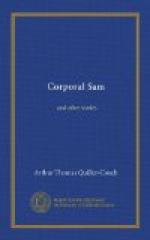This prevailing superabundant good cheer did not, however, extend to the visitor, as the colonel discovered, within the doorway of The Dragon. Nor was that doorway the old hospitable entrance through which the stage-coaches had rattled into a paved court lined with red-windowed offices. The new proprietor had blocked all this up with a flight of steps, and an arrangement of mahogany and plate-glass. There remained but the arch under which, these years ago, the stout coachman, as he swung his leaders sharp round to the entry, had warned passengers to duck their heads. The colonel was staring up at it when he became aware of a liveried boots holding the mahogany door open for him at the head of the steps, and with an expression that did not include ‘Welcome!’ among the many things that it said.
The boots too plainly was sullen, the young lady in the office curt and off-hand, the second and only waiter as nearly as possible mutinous. ‘All his blooming companions,’ he explained (though not precisely in these words), had departed to spend Christmas in the bosom of their families. He spoke cockney English, and, in reply to a question (for the colonel tried hard to draw him into conversation and dissipate his gloom), confessed that he came from Brixton.
Further than this he would not go. In a mortuary silence, the colonel, seated beneath a gasalier adorned (the mockery of it!) with a sprig of mistletoe, sipped his half-pint of sherry, and ate his way through three courses of a sufficiently good dinner. But better, says Solomon, is a dinner of herbs where love is, than a stalled ox and hatred therewith.
Every time he raised his eyes they rested on the table at which he had dined with his father on the eve of being entered at school. The same table, the same heavy mahogany chairs—he recalled the scroll pattern on their backs. He could see himself there in the corner—a small boy, white in the face and weary with travel, divided between surmise of the morrow and tears for the home left behind. He could see his father seated there in profile, the iron-gray hair, the remembered stoop. Well, they were all gone now—all, missing whom that night he had come so near to breaking down and weeping. . . . Mother, sisters, brother, gone one by one during the years of his Indian exile, and himself now left the last of his race, unmarried, and never likely to marry. Why had he come? To revisit his old school? But the school would be closed for the Christmas holidays, the children dispersed to their homes and happy.
Limen amabile
Matris et oscula . .
.
He had ordered claret—a bottle of Lafitte, the best the house could produce—and the waiter, impressed a little by the choice, now appeared noiselessly, almost deferentially, at his elbow, and poured out a first glassful of the wine.
‘Waiter!’
‘Yessir!’




